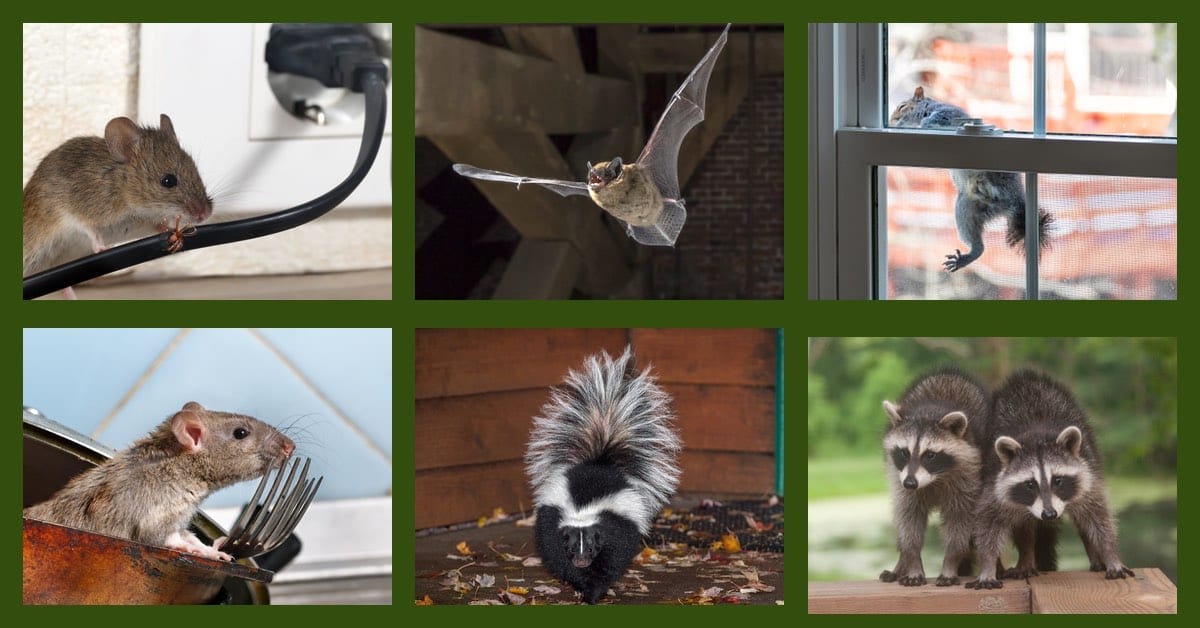Wildlife pests looking for warmth can cause damage to your home
Now that the weather is colder, there are some creatures that may creep into your home for warmth. These animals are looking to get out of the harsh cold and could be hiding in your house for weeks. Some of these critters can also cause damage to your home. Here are six wildlife pests that you should check for and have eliminated from your home as soon as possible.
Mice
You can get rid of mice in your home by setting bait traps. Place the traps near cracks or openings in your doors and windows. Don’t leave food open or loose on your counters. The mice will think your home is a food source. Caulk all paneling and windowsills so that mice won’t be able to get into your home. When these methods don’t work, our professional team can use safe and effective methods to drive the mice away.
Rats
Roof rats and Norway rats are the most common in the United States. Roof rats are most commonly found in the attic, while Norway rats like to live in the basement. It’s usually easier to get rid of rats because they are larger than mice. Placing rodent repellent in the basement or attic can be effective. However, you should also be sure to keep food tightly sealed. Rats tend to be more aggressive when trying to enter your home. Use strong caulking for walls and seal your windows securely to prevent rat entry.
Skunks
Skunks like to live under the foundation of houses. They also find refuge under decks and porches. These animals are natural burrowers. If you see lots of holes in your yard, this could mean a skunk is on your property looking for food. Skunks will likely try to enter your home during early winter. During this time, they are looking for a warm place to prepare for mating in late winter. Skunks are also known by the putrid odor they spray. Check for the smell around your home. If necessary, use traps to catch skunks until your exterminator appointment.
Squirrels
It’s common to find squirrels in your yard. To keep them from getting closer to your home, spray edible plants and flowers with capsaicin. Bolt squirrel cages to your trees and fences to stop these creatures in their tracks. Setting traps with peanut butter or peanuts in the shell can also rid your property of squirrels. Seal any cracks in the walls and block access to the attic to keep squirrels at bay.
Raccoons
Raccoons like to eat both animals and plants. They are often found near trash cans because they search for scraps of food. Raccoons don’t hibernate, but they are significantly less active during winter. Check for tracks around your home. Raccoons walk flat-footed, the same way humans do. This will help you differentiate between raccoon and opossum tracks. These animals like living in chimneys. They can also rake through shingles and shutters to get into a warm home. Keeping these areas secure can prevent raccoons from getting into the house.
Bats
Bats usually will enter homes during the summer through the late fall. During the winter months, they may be hibernating and clustering together in your home. You may not notice they are there until spring arrives. Bats are natural insect predators. When the weather gets warmer outside and you notice fewer insects on your property you may have a bat infestation. The average bat can eat about 600 mosquitos in an hour! If there are bats in your home, this means your house is close to a source of food. Bats also prefer warm climates and like to live in areas where the air has lots of moisture.
Check the holes and crevices of your home, since this is how bats can enter your house. Bats can’t burrow into your house. However, if they get caught in the foundation of your home, their droppings can produce mold. This can lead to serious health problems with your family. Inspect broken screens, open pipes or wires to see if bats have entered your home. Bats also enter homes through chimneys. Our professional exterminators can lure bats out of your home and provide alternatives keeping your home bat-free. Building a bat house near your home will attract the bats to the smaller structure and keep them from infesting your property.
NJ Pest Control is happy to make your home pest-free this winter. We offer a thorough evaluation of your property. We will let you know which wildlife pests are most likely to enter your home, where the point of entry might be and if any are enjoying the warmth at the moment. Our pest elimination methods are also safe. We won’t compromise your family’s health to get the job done. Contact us today for a consultation.

